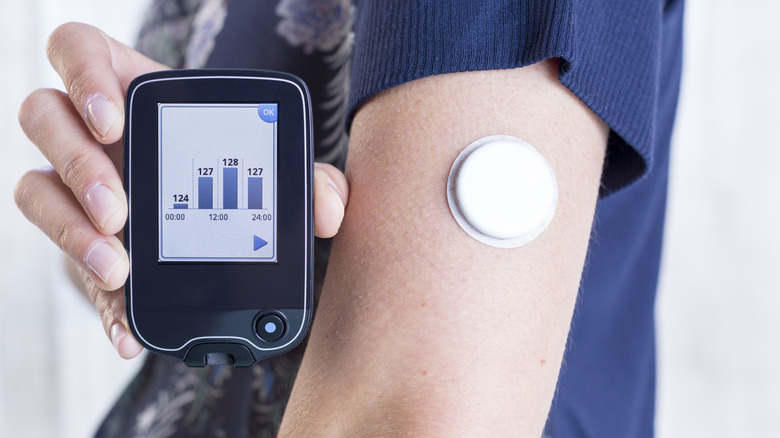Surprising Things That Affect Your Blood Sugar
Blood sugar fluctuations can affect your body in a myriad of ways. Higher-than-normal readings (hyperglycemia) can trigger piercing headaches, blurry vision, and a cranky or sluggish mood (via Health). A dip in blood sugar (hypoglycemia), on the other hand, might leave you feeling shaky, dizzy, or pretty disorientated and out of sorts, according to Healthline.
Blood sugar, also known as blood glucose, is the main sugar found in our blood (via Live Science). The pancreas produces insulin and glucagon, which are responsible for maintaining glucose homeostasis in the body, according to the Johns Hopkins' Sol Goldman Pancreatic Cancer Research Center. Insulin converts the food we eat, specifically dietary carbohydrates, into glucose, circulating it into the bloodstream to supply the body with energy and provide nutrients to our organs, muscles, and nervous system, per Live Science.
For people with diabetes, blood sugar levels can skyrocket due to a failure of the pancreas to secrete adequate amounts of insulin, as noted by the National Institute of Diabetes and Digestive and Kidney Diseases. If left untreated, a persistently high concentration of glucose in the blood can lead to a host of health problems, including nerve damage, kidney disease, and cardiovascular issues. Changes in blood sugar don't just affect diabetics; there are various contributing factors that can sneak up on us, which we may not immediately think of. Here are a few surprising or unexpected things that can drive up your blood sugar or make it plummet below normal levels.
Time of day
Blood sugar levels generally shift throughout the day, wavering between high, low, and normal. Some people experience greater spikes in the evening when blood sugar can be harder to regulate, some wake up with soaring levels in the morning, whereas others may notice a dip in the early hours (via Healthline). These changes stem from various factors including physical exertion and when and what we last ate, according to the National Institute of Diabetes and Digestive and Kidney Diseases.
A surge in blood sugar levels in the morning can be confusing unless you've somehow been feasting or exercising in your sleep. However, it can be attributed to the "dawn phenomenon", which alludes to the changes that occur in the body while you're sleeping (via ADA). Cortisol and growth hormone are released, inciting the liver to churn out glucose to provide sufficient energy for the following day. At the same time, insulin levels wane during the night, resulting in a blood sugar rise at dawn, reported a 2013 study in the journal Diabetes Care.
Another possible cause for your morning blood sugar highs is the "Somogyi effect," sometimes referred to as "rebound hyperglycemia," occurring in people with diabetes (via Cleveland Clinic). This is when the body pumps out hormones like cortisol and growth hormone and the liver releases stored glucose in an attempt to stave off sinking blood sugar levels overnight (via Medical News Today).
Skipping breakfast
Often touted as the most important meal of the day, breakfast — especially one that's high in fiber and contains complex carbohydrates and protein — helps refuel our tanks and replenish our lower-than-normal glucose levels, keeping our blood sugar steady throughout the day (via Healthline). If you skip breakfast, however, your body will kick up its glucose levels. Specifically, the pancreas produces glucagon, sending a signal to the liver to release glycogen, which is then converted into glucose (via Insulin Nation).
Research continues to highlight that skipping breakfast is a surefire way to throw your blood sugar out of whack. A study called the "Bath Breakfast Project" published in the American Journal of Clinical Nutrition showed that breakfast skippers experience more dramatic spikes and dips in blood sugar compared to breakfast eaters. A more recent study published in The Journal of Nutrition found that those who skip breakfast even once a week have an increased risk of developing type 2 diabetes.
"Some small studies suggest that skipping the morning meal can actually lead to more insulin resistance," Jenna Freeman Scudder, a dietitian at the Ohio State University Wexner Medical Center told Healthline. She further explained, "Insulin resistance is a condition that requires more insulin to bring blood sugar into the normal range. And when it's chronic, there's a major risk factor for type 2 diabetes."
Can late-night eating impact your blood sugar?
While a strategic evening snack could prevent blood sugar levels from lowering, devouring a meal right before bed may have the opposite effect, according to the Mayo Clinic. This is particularly true if you're hyperglycemic. A 2020 study published in The Journal of Clinical Endocrinology & Metabolism found that late-night dinners can shoot up blood glucose in the body while you're sleeping — and these elevated levels often persist into the morning, according to the American Diabetes Association.
"This study sheds new light on how eating a late dinner worsens glucose tolerance and reduces the amount of fat burned," says Jonathan C. Jun, study author and medical doctor at Johns Hopkins University School of Medicine (via Endocrine Society).
However, research findings have been mixed. An earlier study found that eating too close to bedtime increases hyperglycemia in people with type 2 diabetes — but not if the meal is divided into three servings and eaten five minutes apart. A 2019 study challenged the theory that avoiding food at least two hours before bed can prevent mounting blood sugar levels as well as other health problems like diabetes and heart disease. It appeared that the duration between eating and going to sleep is of little significance, suggesting that more attention should be paid to other variables instead, like eating healthy foods and appropriate portions, getting enough sleep, and avoiding smoking and alcohol.
Dehydration
About 75% of Americans live with chronic dehydration, which means that even though they're drinking some water throughout the day, their bodies aren't getting a sufficient amount to truly thrive (via CBS).
Most people don't realize the extent to which their water intake can impact their blood sugar. Even a little dehydration can cause the glucose in the bloodstream to become concentrated, spiking up the body's blood sugar levels (via Livestrong). This can lead to a dangerous cycle: Your kidneys make you pee more often to flush out excess glucose from your system, but the more you urinate, the more dehydrated you become (via Healthline).
What's more, when the body's dehydrated, it produces a hormone called "vasopressin", which causes the kidneys to keep in as much fluid as possible while inadvertently hoarding extra glucose, as reported by Livestrong. At the same time, high levels of vasopressin prompt the liver to manufacture more blood sugar. Over time, this is likely to result in insulin resistance and chronic hyperglycemia, as indicated by a 2011 study published in the journal Diabetes Care.
People with diabetes should pay particular attention to how much water they consume to ensure that fluids aren't pulled from other important tissues and organs in the body (via Harvard Health Publishing).
Losing sleep
A lack of sleep can significantly contribute to your blood sugar woes. In particular, it can have a negative effect on your insulin resistance, that is, how efficiently your body utilizes insulin. In support of this, a 2015 review published in Diabetes Therapy highlights that skimping on sleep may hinder glucose control and insulin sensitivity in individuals with type 2 diabetes.
A more recent study published in Psychoneuroendocrinology puts a magnifying glass to the relationship between high glucose levels and cortisol, the body's "fight-or-flight" hormone. It indicates that not getting enough sleep releases cortisol, culminating in higher blood sugar levels. To make matters worse, cortisol makes people feel awake, which can lead to a perpetuating cycle in the long term. People with diabetes and prediabetes (the precursor to type 2 diabetes) typically sleep less and experience poor sleep quality, according to a 2018 study, which only exacerbates their symptoms and impairs cognitive function.
Strong emotions
Swings in your blood sugar can have a noticeable impact on your mood. It's not uncommon for people to experience a pendulum of emotions, seesawing between highs and lows. Equally, your emotions can cause your blood glucose levels to sway. Feeling stressed out, in particular, may trigger spikes and crashes, says the American Diabetes Association.
Stress kicks off cortisol and epinephrine production and the liver churns out extra glucose to give you a burst of energy in the face of a potentially challenging situation (via Diabetes Strong). The accumulation of glucose in the body can make blood sugar levels go haywire, especially for diabetics who have a hard time processing and storing glucose due to insulin resistance (via Everyday Health).
Stress can also have an indirect effect on our blood sugar by interfering with the habits and routines that help keep our glucose levels balanced and under control. For example: "You may start to eat more, change your behavior, or exercise less," Renata Belfort De Aguiar, an assistant professor of medicine in endocrinology at the Yale School of Medicine, explained to Everyday Health.
But it's not just negative stressors that can set off a blood sugar roller coaster. A 2015 review revealed that stress takes various forms, and even feelings of excitement around positive life changes like getting engaged to be married or starting a new job can stimulate our fight-or-flight response, causing our blood glucose levels to creep up.
Being ill or having an infection
Being under the weather can cause your blood sugar levels to soar. This comes back down to the influence of stress hormones like adrenaline and cortisol, according to a report by the Diabetes Research & Wellness Foundation. Upon detecting an illness or infection, like a cold or the flu, your body responds by sending certain hormones to kill the germs. But these chemicals also work against the role of insulin and lead to an increase in glucose, sabotaging blood sugar levels.
When blood sugar runs high, your body's white cells slow down and struggle to perform their usual function of fighting harmful bacteria, revealed the Diabetes Research & Wellness Foundation. In non-diabetics, extra insulin is rolled out to support the white cells, but a person with diabetes doesn't have an adequate insulin supply. This can spiral into hyperglycemia and even put individuals at risk of developing "ketoacidosis," a condition that's been known to bring on a coma or even cause death (via American Diabetes Association).
Intense workouts
Hitting the gym full-swing can mess with your blood sugar in surprising ways. Exercise generally causes glucose levels to drop, according to the American Diabetes Association. During and after a workout, your body increases its ability to use insulin more efficiently, namely it's better able to pull glucose into its cells and use it for energy. If you didn't eat enough beforehand, however, you may experience a drop in blood sugar, which can leave you feeling shaky and weak.
Additionally, some people notice their glucose levels jump after vigorous or strenuous exercise (via diaTribe). Most of the time, this can be attributed to the release of adrenaline, which triggers a cascade of changes in the body in an attempt to supply it with more energy. This is kind of like pouring sugar into the bloodstream. It's generally more problematic for people with diabetes, who are susceptible to developing life-threatening complications like ketoacidosis (via Mayo Clinic).
Gum disease
Gum disease and diabetes don't get along very well. If you've ever struggled with an infection or disease of the gums, you may have noticed your blood sugar creeping up. If so, you're certainly not imagining things. Research has identified a two-way relationship between the two: Severe gum disease is a blood sugar raiser as well as being a common complication of diabetes (via Cleveland Clinic).
When people struggle with high blood glucose, the sugar in their saliva increases, causing harmful germs and plaque to fester and spread around the teeth and gums (via WebMD). This leads to inflammation, causing bleeding, swelling, and soreness of the gums. Scientists also theorize that gum disease can make blood glucose harder to control. It's believed that the bacteria infecting the gums leaks into the bloodstream and weakens the body's immune system, triggering a spike in blood sugar levels in an attempt to destroy the harmful bacteria, details the American Dental Association.
Extreme weather
Whether it's scorching hot or icy cold, extreme weather may be another culprit destabilizing your blood glucose levels. High temperatures can have a varied impact on blood sugar. Some people see their levels shoot through the roof as dehydration puts added stress and strain on the body, whereas others may experience a blood sugar drop (via Everyday Health). By the same token, the excessive cold can create unpleasant conditions that send survival hormones like adrenaline and cortisol whooshing around your system, causing blood sugar levels to run high pretty fast (via Diabetes.co.uk).
The pain and injury caused to the skin by sunburn may heighten blood glucose by compromising your immune system — a bit like having an illness (via T2D) — while the heat can also tamper with the way the body uses insulin, according to the Centers for Disease Control and Prevention. A 2016 study showed that when it's hot outside, there's an increase in the number of people with diabetes who are hospitalized due to falling ill, and that mortality rates tend to be higher.
However, some doctors might prescribe a dose of sunshine for your blood sugar concerns. Research shows that being out in bright sunlight can reduce your risk for developing type 2 diabetes and heart disease by lowering blood insulin and lipid levels.
Medication
While most people know that alcohol and nicotine are blood sugar wreckers, few realize that certain medications also meddle with your glucose levels. In particular, steroids — typically ones used to treat autoimmune conditions and inflammatory disorders — can cause a dramatic leap in blood glucose, acting in a similar way as cortisol by making your liver resistant to insulin (via Healthline).
Commonly used medications like antidepressants, nasal decongestants, and birth control pills may also send your blood sugar levels off-kilter, whereas certain drugs have the potential to lower blood sugar or interfere with your ability to detect signs of hypoglycemia. People who take beta-blockers are also at an elevated risk for developing high blood sugar. Sometimes referred to as beta-antagonists, these are usually prescribed by doctors to manage migraines, anxiety, and cardiovascular symptoms (via Medical News Today).
There are certain drugs that render people more sensitive to the sun, such as antihistamines, ibuprofen, antidepressants, and some diabetes medications, which can cause a rapid rise in blood sugar (via T2D).
Artificial sweeteners
It's common knowledge that certain foods and beverages can send blood glucose levels soaring or sinking. Yet many aren't aware that artificial sweeteners can be blood sugar raisers. A 2020 review published in Frontiers in Nutrition revealed that those sneaky sweeteners in your coffee aren't as innocent as you may think. Researchers found that some sugar substitutes may impair glucose homeostasis and cause ups and downs in blood sugar levels by killing off healthy gut bacteria and damaging intestinal health. This is supported by earlier studies that have investigated the heavy toll that sweeteners can take on gut microbiota and their ability to bring about glucose intolerance and increase individuals' risk of diabetes (via Healthline).
Still, some health professionals maintain that artificial sweeteners have very little effect on our blood sugar (via Mayo Clinic). Instead, it's suggested that people experience a "rebound effect", per Mayo Clinic, whereby they end up consuming more than what's required or eating other high-carb foods because they consider the sweeteners to be "healthy" and "calorie-free" in comparison (via Everyday Health).
Traveling
It's not unheard of for people to experience wonky blood sugar while traveling and vacationing. A rise in blood glucose levels can be a ripple effect of the body's stress response to being on the road and gallivanting the globe. Between the chaos of simply reaching a destination to a change in meal times and activity levels, your blood sugar may respond by raising or lowering (via Healthline).
Air travel itself can also cause alterations to your blood sugar levels. The altitude and change in atmospheric pressure while being up in the air, particularly on long-haul flights, can provoke blood glucose in different ways, causing either a jump or a plunge in levels (via WebMD). Based on a 2019 study published in the journal Medicine, frequent episodes of low blood sugar are common among diabetic travelers crossing multiple time zones due to the disruption of circadian rhythms and effects of jet lag.
Hormones
The role that insulin plays in processing and controlling blood glucose has been pretty well-documented. But there are other naturally-occurring hormones that also influence the way our blood sugar wavers, such as glucagon (via Diabetes Education Online). This is released by the islet cells in the pancreas, and it regulates the production of glucose and ketones in the liver. Generated overnight and in between meals, glucagon helps keep our blood sugar levels balanced. After we eat, when sugar enters into the bloodstream, the amount of glucagon in the body drops since our liver doesn't need to churn out any more sugar. But in diabetics, these levels tend to increase, causing our blood sugar to rise up.
Hormonal issues like polycystic ovarian syndrome (PCOS) are another major contributor to blood sugar spikes, informs the Centers for Disease Control and Prevention. This is because women with PCOS are generally insulin resistant. Their bodies produce excess androgens (male hormones that females also possess) due to a disrupted endocrine system, which is suspected to result in elevated glucose circulating the blood, making them prone to diabetes (via HealthyWomen).
A sedentary lifestyle
A sedentary lifestyle contributes to many different health problems. Unsurprisingly, it may also land you in blood sugar turmoil. A study published in Medicine & Science in Sports & Exercise journal looked at how inactivity affects the way the body regulates blood sugar. Researchers monitored participants' glucose levels throughout the day while tracking how much exercise and activity they got. During the first three days, subjects followed their normal exercise routines: This consisted of at least 10,000 daily steps (an average of almost 13,000), which the American Heart Association recommends as a healthy goal. Subjects were later asked to cut this in half, without altering their diet in any way. The findings revealed significant spikes in blood sugar after the volunteers ate, which hadn't happened while they were active.
"We hypothesize that, over time, inactivity creates the physiological conditions that produce chronic disease," John P. Thyfault, study author and an associate professor at the University of Missouri, said to The New York Times, explaining that even some light movement is beneficial in terms of keeping blood sugar levels stable and reducing your risk of type 2 diabetes and heart disease.















